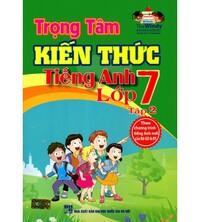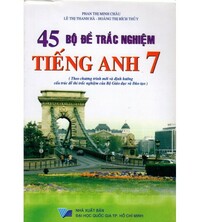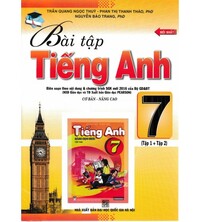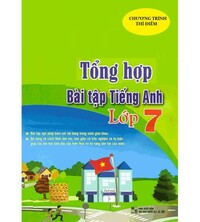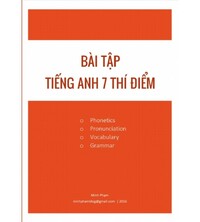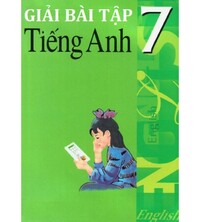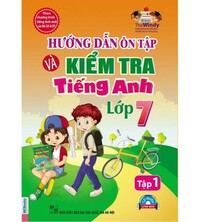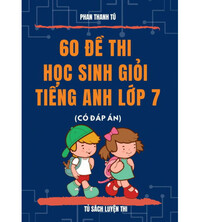Tiếng Anh 7 Unit 9 Looking back
1. Circle the correct words or phrases in brackets. 2. Complete each sentence by filling in the blank with a word or phrase in the box. 3. Choose the correct question A or B. 4. Answer the following questions about yourself.
Bài 1
Vocabulary
1. Circle the correct words or phrases in brackets.
(Khoanh tròn các từ hoặc cụm từ đúng trong ngoặc.)
1. There wasn't a (light / fireworks) display on New Year's Eve last year.
2. She was the best actress at the (Cannes Film Festival / music festival) last year
3. At Easter, children enjoy (painting / buying) Easter eggs.
4. People prepare (moon cakes / candy apples) for Halloween.
5. For (Thanksgiving / Tet), people have a feast with turkey, cornbread, and sweet potatoes.
Phương pháp giải:
- light (n): ánh sáng
- fireworks (n): pháo hoa
- Cannes Film Festival (n): Liên hoan phim Cannes
- music festival (n): lễ hội âm nhạc
- painting (v): vẽ
- buying (v): mua
- moon cakes (n): bánh trung thu
- candy apples (n): kẹo táo
- Thanksgiving (n): Lễ Tạ ơn
Lời giải chi tiết:
|
1. fireworks |
2. Cannes Film Festival |
3. painting |
4. candy apples |
5. Thanksgiving |
1. There wasn't a fireworks display on New Year's Eve last year.
(Năm ngoái không có bắn pháo hoa vào đêm giao thừa.)
2. She was the best actress at the Cannes Film Festival last year.
(Cô ấy là nữ diễn viên xuất sắc nhất tại Liên hoan phim Cannes năm ngoái.)
3. At Easter, children enjoy painting Easter eggs.
(Vào lễ Phục Sinh, trẻ em thích vẽ những quả trứng Phục sinh.)
4. People prepare candy apples for Halloween.
(Mọi người chuẩn bị kẹo táo cho Halloween.)
5. For Thanksgiving, people have a feast with turkey, cornbread, and sweet potatoes.
(Đối với Lễ Tạ ơn, mọi người tổ chức một bữa tiệc với gà tây, bánh mì ngô và khoai lang.)
Bài 2
2. Complete each sentence by filling in the blank with a word or phrase in the box.
(Hoàn thành mỗi câu bằng cách điền từ hoặc cụm từ trong hộp vào chỗ trống.)
|
floats costumes Bunny gathering lion dances |
1. The best part of the Mid-Autumn Festival is the performance of _________.
2. There are flower _________ in the Tulip Festival.
3. We like to wear traditional _________ at Tet.
4. One of the symbols of Easter is the Easter _________.
5. The Twins Day Festival is the largest _________ for twins in the world.
Phương pháp giải:
- floats (n): xe diễu hành
- costumes (n): trang phục truyền thống
- Bunny (n): Thỏ Phục sinh
- gathering (n): sự tụ họp
- lion dances (n): điệu múa lân
Lời giải chi tiết:
|
1. lion dances |
2. floats |
3. costumes |
4. Bunny |
5. gathering |
1. The best part of the Mid-Autumn Festival is the performance of lion dances.
(Thứ đặc sắc nhất của Tết Trung thu là tiết mục múa lân.)
2. There are flower floats in the Tulip Festival.
(Có xe hoa diễu hành trong Lễ hội Hoa Tulip.)
3. We like to wear traditional costumes at Tet.
(Chúng mình thích mặc trang phục truyền thống vào dịp Tết.)
4. One of the symbols of Easter is the Easter Bunny.
(Một trong những biểu tượng của lễ Phục sinh là Chú thỏ Phục sinh.)
5. The Twins Day Festival is the largest gathering for twins in the world.
(Lễ hội Ngày Song sinh là lễ hội tụ họp lớn nhất của các cặp song sinh trên thế giới.)
Bài 3
Grammar
3. Choose the correct question A or B.
(Chọn câu đúng trong câu A hoặc câu B.)
1. A. Did you go to the Lim Festival yesterday?
B. Are you go to the Lim Festival yesterday?
2. A. Are they always celebrate the festival in May?
B. Do they always celebrate the festival in May?
3. A. Will you wear a costume for Halloween?
B. Will do you wear a costume for Halloween?
4. A. Does he interest in joining the festival?
B. Is he interested in joining the festival?
5. A. Do people listen to traditional songs at Hoi Mua Festival last year?
B. Did people listen to traditional songs at Hoi Mua Festival last year?
Lời giải chi tiết:
|
1. A |
2. B |
3. A |
4. B |
5. B |
1. A. Did you go to the Lim Festival yesterday?
(Hôm qua bạn có đi Hội Lim không?)
Giải thích: “yesterday” (hôm qua)nên sử dụng thì quá khứ đơn => Did you go …
2. B. Do they always celebrate the festival in May?
(Họ luôn tổ chức lễ hội vào tháng Năm phải không?)
Giải thích: “always” (luôn luôn) nên sử dụng thì hiện tại đơn, chủ ngữ “they” số nhiều => Do they always celebrate …
3. A. Will you wear a costume for Halloween?
(Bạn sẽ mặc một bộ trang phục lễ hội vào Halloween chứ?)
Giải thích: Sử dụng thì tương lai đơn => Will you wear …
4. B. Is he interested in joining the festival?
(Anh ấy có quan tâm đến việc tham gia lễ hội không?)
Giải thích: “interested in joining” (quan tâm đến việc tham gia) nên sử dụng thì hiện tại tiếp diễn, chủ ngữ “he” số ít => Is he interested in joining …
5. B. Did people listen to traditional songs at Hoi Mua Festival last year?
(Mọi người có nghe các bài hát truyền thống ở Hội Mùa vào năm ngoái không?)
Giải thích: “last year” (năm ngoái) nên sử dụng thì quá khứ đơn => Did people listen …
Bài 4
4. Answer the following questions about yourself.
(Trả lời các câu hỏi sau đây về bản thân bạn.)
1. Are you interested in festivals?
2. Do you eat banh chung at Tet?
3. Can you cook any traditional food?
4. Did you see a fireworks display last year?
5. Does your family gather together at Tet?
Lời giải chi tiết:
1. Are you interested in festivals?
(Bạn có hứng thú với các lễ hội không?)
- Yes, I am. / No, I am not.
(Có. / Không.)
2. Do you eat banh chung at Tet?
(Bạn có ăn bánh chưng vào ngày Tết không?)
- Yes, I do. / No, I don't.
(Có, mình có. / Không, mình không.)
3. Can you cook any traditional food?
(Bạn có thể nấu món ăn truyền thống nào không?)
- Yes, I can. / No, I can't.
(Có, mình có thể. / Không, mình không thể.)
4. Did you see a fireworks display last year?
(Bạn có xem bắn pháo hoa vào năm ngoái không?)
- Yes, I did. / No, I didn't.
(Có, mình đã đi. / Không, mình đã không đi.)
5. Does your family gather together at Tet?
(Gia đình bạn có quây quần bên nhau vào dịp Tết không?)
- Yes, we do. / No, we don't.
(Có, nhà mình có. / Không, nhà mình không.)
Search google: "từ khóa + timdapan.com" Ví dụ: "Tiếng Anh 7 Unit 9 Looking back timdapan.com"
